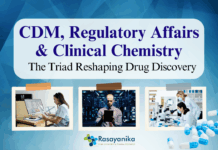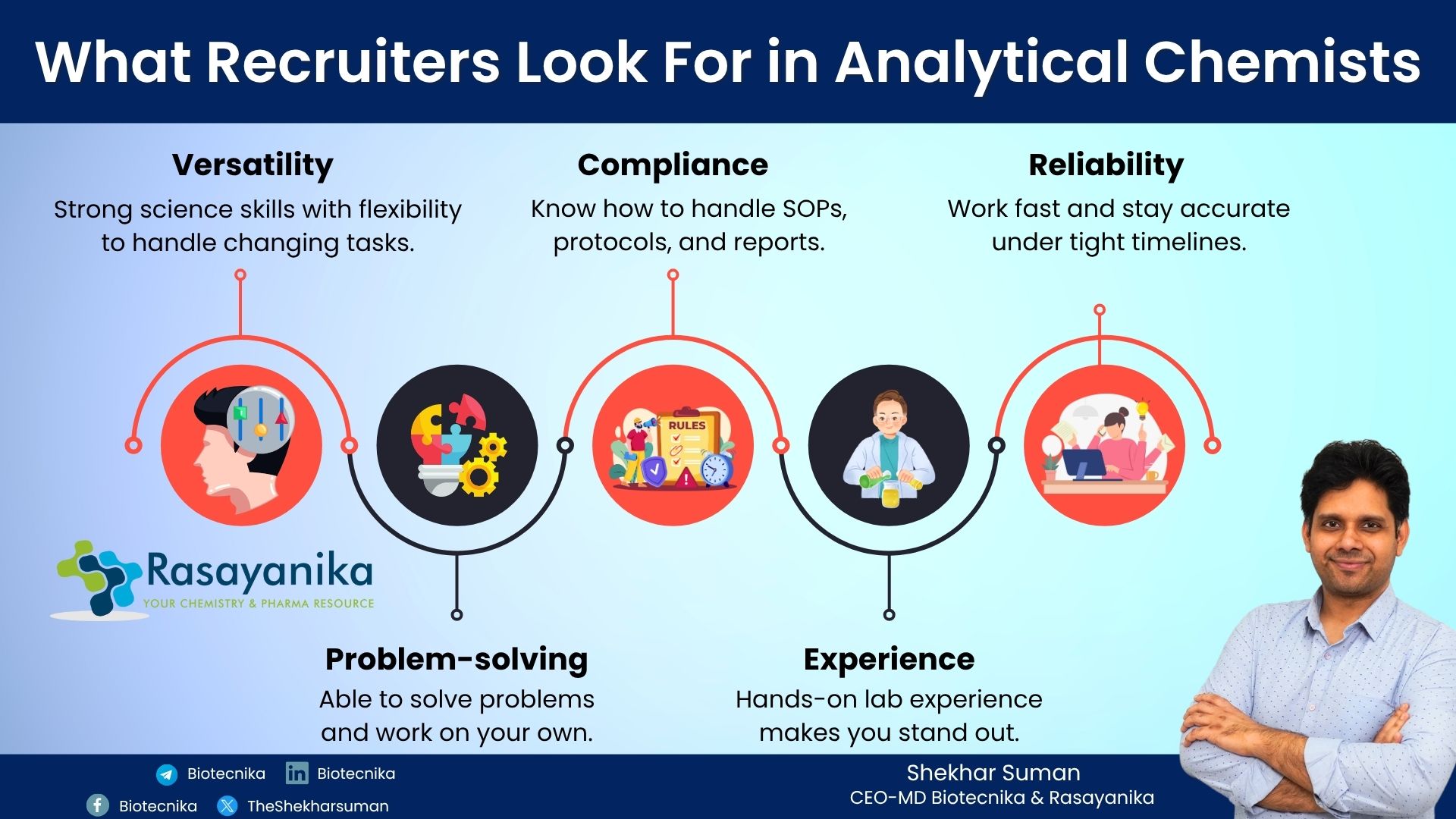Analytical Chemists in Pharma: The Growing Demand and What It Means for You
Ever popped a pill and wondered how it fixes your body the same every single time? There is no magic behind it, but a pure science, more precisely, chemistry. It’s the result of countless experiments and hours of research by the unsung hero of the pharmaceutical world. We call them Analytical Chemists. Often, doctors get all the credit, and pharmacists fill the prescriptions. It’s analytical chemists who ensure that every drug we take is safe, pure, and potent.
Do you know that the pharmaceutical industry is thriving with advancements in the field of science? New drugs, strong regulations, and global health demands are increasing the demand for analytical experts. The most exciting part is that with these growing demands, new opportunities are emerging for students and young professionals like you. If you’re someone who loves lab coats, has a curious mind, and possesses the right skills, this is the perfect fit for you.
Let’s take a look at why analytical chemists are more critical than ever before. And what this growing demand could mean for your future.
What Do Analytical Chemists Do?
These professionals are more focused on understanding the composition of chemical substances. In the world of pharmaceuticals, the composition of the substance is what matters. They analyze the drug compounds and the final products to ensure they meet the standard regulatory guidelines.
With both traditional and modern tools and techniques, these professionals work precisely, making a powerful impact on society. They work with some of the most sophisticated instruments like HPLC (High-Performance Liquid Chromatography), GC (Gas Chromatography), UV-visible spectroscopy, and Mass Spectrometry.
With these, they can detect even the smallest amount of impurities. But their job is not just testing. It’s also about developing and validating methods to measure how much of a compound is present in a sample. They also have to check whether the compound will stay stable over time.
An Analytical Chemists in Pharma plays an essential role throughout the drug development process. From the very early stage of research and clinical trials to manufacturing and quality control, they play a central role. A team of analytical chemists investigates the drugs and reformulates them when required.
Why Is the Demand for Analytical Chemists Rising?
Have you ever given a thought to the journey of the drug? Do you know what goes on behind the scenes before a drug comes to the market? Long before it’s packed in blister foil or poured into a bottle, a group of analytical chemists works hard on it. From testing and measuring to validating each component, they make sure it’s just right. In the last few decades, these chemists have been the busiest people ever, all thanks to the medical complexity around the world.
In the recent past, they have become the beating heart of the pharmaceutical industry. From the rush to develop life-saving vaccines to the innovating new drug formulations, they are the minds behind the changing pharma industry.
But do you know what’s driving this demand? Why do many companies out there want to hire them? Let’s break this down and understand it one by one.
- Booming Pharma Sector
As we know, the pharmaceutical industry is growing at a rapid pace, especially after the recent pandemic. The world is now more focused on vaccines and antiviral drugs. Many companies are investing in drug discovery, personalized medicines, and biologics. Each of these innovations demands chemical analysis. And that’s where the analytical chemists come into play.
- Tighter Rules Around Drug Safety
The national and international government agencies are now enforcing strict rules regarding drug safety and quality. Some of these agencies are the FDA (Food and Drug Administration), the EMA (European Medicines Agency), and the CDSCO (India). The analytical data forms the backbone of these regulatory submissions. When a company fails to prove its drug’s identity, purity, and strength, the drug won’t reach the market.
So, pharmaceutical companies hire analytical chemists who not only help them meet the guidelines but also stay ahead.
- R&D Is Shifting Toward Complex Drugs
We all know that modern drugs are not simple. Biopharmaceuticals, personalized therapies, and non-formulations are the trending topics. These require high-end analytical techniques and expert interpretations. Entry-level jobs often begin with basic assays. However, companies are seeking analytical scientists and specialists in complex systems.
- Global Outsourcing and CRO Expansion
Currently, most pharmaceutical companies outsource some part of their work to Contract Research Organizations (CROs). These CROs require large and skilled teams to handle method development, stability studies, and other related tasks.
The outsourcing trend suggests that job opportunities are no longer limited to high-pharma companies. You will also find them in analytical labs, startups, and regulatory consulting firms.
How will your day be as an Analytical Chemist in Pharma?
Every day will be different from the day before. However, most analytical chemists will work in the lab as well as with computers. Your day might start with sample preparation, followed by running them in high-end instruments. In the afternoon, you will analyze data and write reports.
Remember, partnership is the key to success. Analytical Chemists in Pharma work closely with formulation scientists, quality assurance teams, and regulatory affairs specialists. In this job, you will also handle raw data a lot. Being comfortable with software tools like Empower, Chromeleon, or LIMS (Laboratory Information Management Systems) will make things easier.
While you are working as an analytical chemist, no one expects you to memorize every chemical equation every day. But you need a solid foundation in chemistry, instrumentation, and statistics.
Skills You’ll Need to Succeed
Here’s some good news for you. This career path does not require a PhD to get started. With a bachelor’s or master’s degree in chemistry, pharmaceutical sciences, or any other related field, you can land an entry-level position. However, it’s your key skills that set you apart from the rest. You need skills that are listed below:
- Attention to Detail: The most important skill for a chemist is paying attention to every detail happening inside the lab because, with just one decimal point off, your data could be rejected.
- Hands-on Lab Experience: In this profession, you have to work with some of the most sophisticated instruments like HPLC and GC, so you need practical experience.
- Documentation Skills: As a chemist, you must have the ability to record information clearly and accurately, as every detail is vital.
- Understanding of ICH Guidelines: These global standards guide everything from method validation to stability studies.
- Patience and Persistence: Sometimes, methods fail, or data is inconsistent. Staying calm and methodical is essential.
Along with technical skills, one must also possess soft skills. These skills include clear communication, problem-solving, and teamwork. These skills will take you far in this field.
Career Paths and Growth Opportunities
Starting as a QC Analyst or Analytical Chemists in Pharma, you can grow into roles like:
- Senior Scientist
- Method Development Specialist
- Validation Scientist
- Regulatory Affairs Expert
- Quality Control Manager
As they advance in their careers, some professionals transition into roles such as R&D, regulatory affairs, or project management, aligning with their interests and strengths.
What Are Companies Looking For?
Although technical knowledge is important, many pharmaceutical companies also look for adaptability. The world of pharma is moving faster, and you will find yourself working on multiple projects with tight deadlines. Hiring managers look for candidates who possess critical thinking skills. They often prefer people who work independently while maintaining scientific integrity.
If you have completed internships during your undergraduate and graduate studies, be sure to highlight them. Familiarity with regulatory documentation (like SOPs, protocols, and reports) can be a bonus.
How to Prepare: Academic and Training Pathways
If you’re in college right now, take every opportunity to work in labs – either through internships or research projects. Many institutions offer short-term industrial training programs in analytical chemistry or pharmaceutical QA/QC.
Courses or certifications in instrument handling, method validation, and data interpretation are also worth considering. You can even explore online modules, but practical exposure will always carry more weight.
For postgraduates, thesis projects focused on analytical method development, drug impurity profiling, or dissolution testing will significantly enhance the value of your CV.
Is It a Stable and Rewarding Career?
Yes, very much so. Analytical chemists play a crucial role in every stage of pharmaceutical manufacturing and are often the last line of defense before a product reaches the market.
Job security is strong, especially in regions with booming pharmaceutical and biotech sectors, such as India, the US, and parts of Europe. Salaries are competitive, with room for growth. Entry-level positions may start modestly, but experience, specialization, and leadership roles can lead to significant raises.
More importantly, you get the satisfaction of working on something that directly impacts human health and well-being.
Is This Career Path for You?
If you enjoy solving puzzles, working with high-precision instruments, and have a natural curiosity for what’s inside a pill or vaccine, then analytical chemistry in pharma could be your calling. It is a combination of science, technology, and purpose in a way few careers can.
As the need for safe and effective medicines continues to rise, developing new drugs has become more complex. And that’s precisely why analytical chemists are more important than ever.
Whether you are still figuring out your next step or someone who wants to explore the world of pharmaceuticals, take a closer look at analytical chemistry. It is the career you want to pursue. The one that gives you job satisfaction as well as a promising future.















































